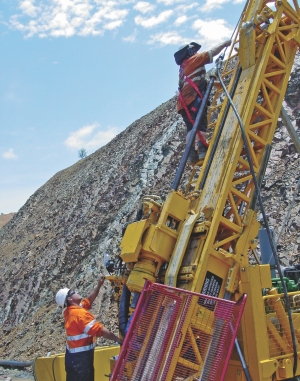VANCOUVER — Denver-based Vista Gold (VGZ-T, VGZ-X) has released a prefeasibility study for its Mt. Todd gold project in Australia that pegs reserves at 2 million oz. gold.
Using a US$950-per-oz. gold price and a cutoff of 0.55 gram gold per tonne, the study established base case reserves of 60.05 million tonnes grading 1.05 grams gold for the Batman deposit at Mt. Todd.
The established reserves should sustain a 9-year mine life, producing 187,500 oz. gold annually. Milling rates would be 18,500 tonnes a day while the company mined 22.9 million tonnes of ore a year by open pit.
The study estimates total cash production costs of US$487 per oz., assuming an exchange rate of US85¢ to the Australian dollar. Pre-production capital costs were pegged at US$441.3 million and sustaining capital at US$33 million.
The numbers translate into an internal rate of return of 14.9% before tax and 9.8% after tax. The pretax net present value, using a 5% discount, was set at US$210.1 million. The economics naturally improve if the current spot price of gold is used.
The study is based on an undated resource that Vista released in June. Using a cutoff of 0.4 gram gold, the measured and indicated resource stands at 191 million tonnes grading 0.84 gram gold and a further 94 million inferred tonnes of 0.74 gram gold.
The project is located in the Northern Territories, 230 km southeast of the port of Darwin. Vista acquired it in 2006 for about US$2 million several years after the previous owner, Pegasus Gold Australia, went bankrupt. Pegasus had spent roughly US$200 million developing the project between 1993 and 1997.
Pegasus went down not only due to the low price of gold, but also technical difficulties at the mine, so Vista undertook an extensive review of why Pegasus failed. The company found that Pegasus mainly did not accommodate for the ore hardness and had metallurgical problems.
Vista has outlined a different processing method to deal with the hard ore, including the use of high-pressure grinding rolls that it expects to significantly improve the efficiency of the grinding circuit.
As to the metallurgy, Vista has stated that the upper section of the orebody, which has already largely been mined out, had secondary minerals that were very soluble in cyanide. This greatly increased the expense of leaching. However, mineralization in the lower part of the orebody, where the company plans to mine, generally has a very minor effect on leaching and cyanide consumption. Vista’s testing showed ore leaching, combined with a carbon- in-pulp recovery circuit, yields “acceptable” recoveries of 82%.
Vista’s stock price jumped 25¢ or 14.5% on the prefeasibility news to close at $1.98. It has a 52-week trading range of $1.33-$3.59 and 46.6 million shares outstanding.


Be the first to comment on "Positive economics for Vista’s Mt. Todd"